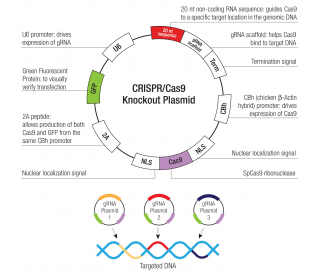Purity
>95%, by SDS-PAGE under reducing conditions and visualized by silver stain
Endotoxin Level
<0.10 EU per 1 μg of the protein by the LAL method.
Activity
Measured by its ability to inhibit BMP-6-induced alkaline phosphatase production by ATDC5 mouse chondrogenic cells. The ED 50 for this effect is 1‑4 µg/mL in the presence of 150 ng/mL of Recombinant Human BMP-6 (Catalog # 507-BP).
Source
Mouse myeloma cell line, NS0-derived Cys25-Phe222, with a C-terminal 10-His tag
Accession #
N-terminal Sequence
AnalysisCys25
Predicted Molecular Mass
23.5 kDa
SDS-PAGE
25-35 kDa, reducing conditions
Carrier Free
What does CF mean?
CF stands for Carrier Free (CF). We typically add Bovine Serum Albumin (BSA) as a carrier protein to our recombinant proteins. Adding a carrier protein enhances protein stability, increases shelf-life, and allows the recombinant protein to be stored at a more dilute concentration. The carrier free version does not contain BSA.
What formulation is right for me?
In general, we advise purchasing the recombinant protein with BSA for use in cell or tissue culture, or as an ELISA standard. In contrast, the carrier free protein is recommended for applications, in which the presence of BSA could interfere.
756-TG |
| 756-TG/CF |
Formulation Lyophilized from a 0.2 μm filtered solution in PBS with BSA as a carrier protein. | Formulation Lyophilized from a 0.2 μm filtered solution in PBS. | |
Reconstitution Reconstitute at 100 μg/mL in sterile PBS containing at least 0.1% human or bovine serum albumin. | Reconstitution Reconstitute at 100 μg/mL in sterile PBS. | |
Shipping The product is shipped at ambient temperature. Upon receipt, store it immediately at the temperature recommended below. | Shipping The product is shipped at ambient temperature. Upon receipt, store it immediately at the temperature recommended below. | |
Stability & Storage: Use a manual defrost freezer and avoid repeated freeze-thaw cycles.
| Stability & Storage: Use a manual defrost freezer and avoid repeated freeze-thaw cycles.
|
Background: TSG
Twisted Gastrulation-1 (TSG or TWSG1) is a cysteine-rich 24 kDa secreted glycoprotein that regulates BMP signaling (1, 2). It was initially identified for its role in dorsal/ventral patterning in Drosophila and Xenopus (1). Mouse TSG cDNA encodes 223 amino acids (aa) including a 25 aa signal peptide and a 198 aa mature protein with a cysteine-rich region (aa 26 ‑ 77) that interacts with BMPs and a C-terminal binding site for chordin (1, 3). Mouse TSG shares 98% aa identity with human, rat, canine, equine, bovine and porcine TSG. TSG can act as either an antagonist or an agonist for BMP signaling (1 ‑ 10). As an antagonist, the N-terminal domain of TSG can bind and inhibit BMP proteins directly, interfering with BMP receptor binding and activity (1, 4). Formation of a complex of TSG with chordin further enhances BMP inhibition (1, 4). As a BMP agonist, TSG promotes TLL-1 metalloproteinase cleavage of chordin to fragments that no longer inhibit BMP activity (3, 5). TSG effects on chordin are influenced by its concentration (2). TSG is widely expressed in the mouse embryo, and is co‑expressed with chordin and BMPs 2, 4 and 7 in the developing limbs (1). Mice lacking TSG show varying degrees of abnormality in bone, cartilage, forebrain, thymus and spleen, in part dependent on the mouse background (2, 5 ‑ 8). In bone, TSG participates with crossveinless-2 (CV-2) to create BMP activity gradients and limit osteoclast differentiation (6, 7). Postnatally, TSG is strongly expressed in growth plate cartilage where it limits collagen expression and enhances osteoblast differentiation and endochondral ossification (2, 4). TSG also modulates BMP and TGF-beta signaling in thymocytes, T cells and early erythrocytes (9 ‑ 11).
References:
Scott, I.C. et al. (2001) Nature 410:475.
Gazzerro, E. et al. (2006) Bone 39:1252.
Oelgeschlager, M. et al. (2003) Development 130:4047.
Schmidl, M. et al. (2006) J. Biol. Chem. 281:31790.
Zakin, L. and E.M. De Robertis (2004) Development 131:413.
Sotillo Rodriguez, J.E. (2009) J. Bone Miner. Res. 24:1917.
Zakin, L. et al. (2008) Dev. Biol. 323:6.
Nosaka, T. et al. (2003) Mol. Cell. Biol. 23:2969.
Graf, D. et al. (2002) J. Exp. Med. 196:163.
Tzachanis, D. et al. (2007) Blood 109:2944.
Tanno, T. et al. (2009) Blood 114:181.
Long Name:
Twisted Gastrulation Homolog 1 [Drosophila]
Entrez Gene IDs:
57045 (Human); 65960 (Mouse)
Alternate Names:
TSG; TSGtwisted gastrulation protein homolog 1; twisted gastrulation homolog 1 (Drosophila); TWSG1










